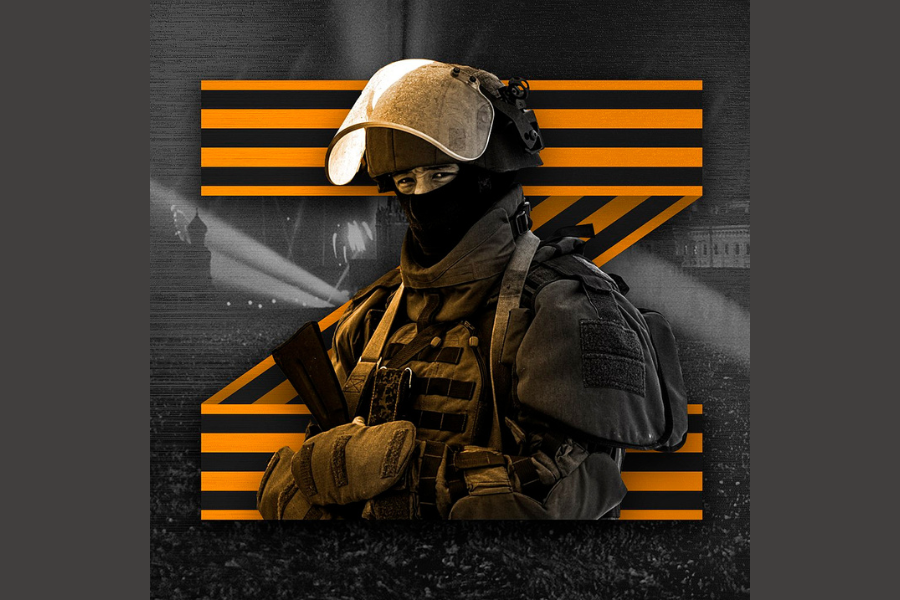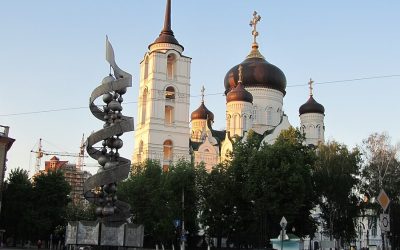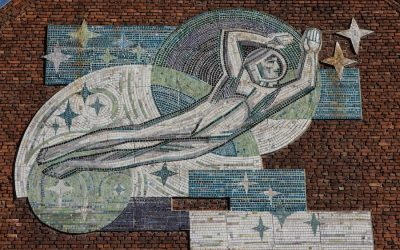How Russian universities are working to normalize the war
Dmitry Dubrovsky
Photo: “Visual propaganda” also works to normalize the war. Photo: Mil.ru, CC BY 4.0 <https://creativecommons.org/licenses/by/4.0>, via Wikimedia Commons
According to the latest research by sociologists, in 2024 the war became part of the Russian socio-cultural landscape. The same process is occurring in Russian academia: the war is gradually turning from an extraordinary event into a routine part of academic daily life.
“Universities for the Front”
Russian universities are involved in this process of normalization.
Routinization concerns the practice of weaponization—using universities for the purposes of supporting the military campaign, social normalization, and the glorification of “special military operation fighters,” as well as the rationalization and legitimization of the war unleashed by Russia.
The Ministry of Science and Education has created an entire program called “Universities for the Front.” According to this plan, “…volunteers collect humanitarian aid, [while] scientists create various devices to handle the needs of the front.”
Daily Practices
A university’s level of engagement in pro-war activities seems to depend largely on the amount of additional budgetary funding it is allotted. Even before the war, European University at St. Petersburg (EUSP) researcher Daria Gerashchenko drew attention to the fact that those universities and rectors who receive additional funding for projects to finance leaders in higher education are far less independent.
As a result, pro-war activities look different in different universities. The examples listed below can be seen in some universities but not others.
Nonetheless, the war has been integrated into daily practice in Russian universities.
Admissions quotas for veterans. First and foremost, the war has entered universities through the special quotas for “veterans of the special military operation” and their children. The importance of this work for the Kremlin is evidenced by the fact that the chairman of the board of the “Defenders of the Fatherland” State Foundation to Support Participants in the Special Military Operation is Putin’s niece, Anna Tsivileva. This is the foundation that primarily deals with these programs for universities. In June, Tsivileva also became Deputy Minister of Defense of the Russian Federation.
Serious admissions quotas for “veterans” were established all the way back in 2023. For instance, 4% of those admitted to Dagestan State University in 2023 were “enrolled under a special quota.” In military universities, this quota was increased to 10 percent of all applicants in 2024. The maximum age for admission was raised to 30 years.
Universities organize “advanced training courses” for veterans. Thus, at St. Petersburg State University, the following courses are offered to those “returning from the special operation zone”:
- Health and safety at work
- Features of social work with youth, taking into account modern trends and mechanisms for protecting youth from the destructive influence of information risks
- Programming languages for app development and databases
Upon completion of these courses, special military operation veterans become not only students, but also teachers in schools and universities.
A patriotic military education. A special emphasis is placed on the methodological propaganda known as “patriotic military education.”
The All-Russian campaign “I Serve the Fatherland,” under the auspices of the aforementioned “Defenders of the Fatherland” foundation, is called upon to mobilize “veterans of the special military operation” in order to “convey to young children the truth about heroism, about the Homeland, about courage.” As part of this project, more than 300 veterans must prepare public lectures, including lectures for students.
Pro-war events. Universities regularly organize various public events aimed at demonstrating support for the war. This happens both within the framework of state programs and on the initiative of various propagandists within universities.
Thus, “veterans of the SVO,” as well as military and state propagandists, are constantly giving lectures to students in which they tell them that “Ukraine is anti-Russia” and that everything reported by the Western media is “fake news.”
For example, war correspondent Maryana Naumova gave a lecture at the Higher School of Economics, while the main voice of propaganda at Kutafin Moscow State Law University is Maria Zakharova.
It has become commonplace for students to meet with “veterans of the SVO,” who discuss how “our valiant soldiers and officers defend the interests of Russia in the special military zone” and “the qualities that every man and citizen of the Russian Federation should develop within himself.”
However, according to some reports, these assemblies are not very popular, with the result that students are often forced to attend them.
Visual propaganda. Even that which in Soviet times was called “visual propaganda” works to normalize the war. Universities have installed information stands and bulletin boards celebrating students and teachers who are considered “heroes of the special military operation.” The Northern (Arctic) Federal University named after M.V. Lomonosov (NArFU) boasts such a display, which not only tells the stories of the university’s own “heroes of the special military operation,” but also provides information about “charity events and scientific projects implemented in the interests of the soldiers.”
Military training centers. Another important component of the war propaganda machine is the Military Training Centers, which are tasked with providing not only military training, but also so-called “patriotic military education.”
These centers often employ “veterans of the special military operation.” In fact, the center at NArFU is headed by one.
Within these centers, in addition to military specialties, students can obtain the professions of “military translator,” “deputy commander for military-political work,” and even “military journalist” (at Voronezh State University, for example).
Patriotic student societies. Various types of “patriotic student societies” are being coordinated by military training centers and have been brought together under the “I Am Proud” Association of Student Patriotic Clubs.
It is worth noting that such a club was started at NArFU on February 22, 2022—that is, two days before the start of the full-scale war.
Military contracts. The influence of the military propaganda machine can be felt in the stories of those students and postgrads who voluntarily signed contracts with the Ministry of Defense and went to war. Though, as the publication Argumenty i Fakty, which publishes such stories, specifies, these cases are unique for each university.
Drones and camouflage nets. There are known cases of “drone collections” at technical colleges or universities (including at Alabuga-Polytech). Various institutes and universities also often organize the weaving of camouflage nets “for the front.”
Blood, money, and “humanitarian aid.” The most frequently organized types of events are blood drives, various kinds of “humanitarian aid to fighters” (as is happening at St. Petersburg State University), and fundraisers for “frontline needs.” As the official website of the Irkutsk Technical University indignantly notes, money collection was conducted “exclusively on a voluntary basis,” which evidently means that it was an issue of extortion.
500 Universities
According to the report of the Ministry of Science and Higher Education, about 500 Russian universities are involved in all kinds of “charitable” activities.
Universities in the “New Territories”
Another aspect of the normalization of the war has been the active involvement of leading Russian universities in developing universities in the “new territories,” as they are shamefully called in the Russian Federation.
St. Petersburg State University sends books to Mariupol, which was destroyed by Russian troops.
The Higher School of Economics signed an agreement with the universities of the “LPR” under which students and teachers from this occupied territory attend internships across the university’s various campuses.
* * *
Rectors who received their positions as a result of the higher education reform are especially active in initiating and supporting “patriotic military” practices. This support for and promotion of the “special military operation” makes them effective managers of higher education in the era of full-scale war.
Thus, war, constant mobilization, propaganda, and work with “new universities” have become part of the daily life of Russian universities, routinizing both the war itself and the practices associated with it.
Dmitry Dubrovsky holds a PhD in History and is a researcher in the social sciences department at Charles University (Prague), a research fellow at the Center for Independent Sociological Research in the USA (CISRus), a professor at the Free University (Latvia), and an associate member of the Human Rights Council of St. Petersburg.





0 Comments